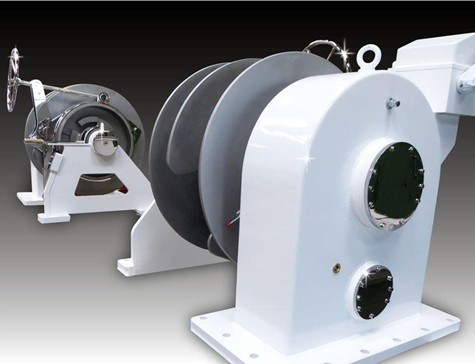Winches
Winches on commercial vessels are mechanical devices that provide the pulling force to control ropes, cables, or chains, thus they are essential for tasks like anchoring, mooring, towing, and handling heavy cargo.
Choosing the right winch for your ship depends on:
- the specific tasks you intend to perform
- the load capacity
- the speed required
- the environment in which the winch will operate.

Common types include anchor winches (also called windlasses) for deploying and retrieving anchors, mooring winches for securing the vessel to a dock and towing winches for assisting other ships.
These winches are powered by manual, electric, or hydraulic systems. They must be robust to withstand harsh marine environments, and can be automated with tensioning systems for safety and efficiency.
Types of winches we can supply:
Anchor Winches (Windlasses):
Used to lower and raise a ship’s anchor, providing a secure connection to the seabed.
Mooring Winches:
Used to secure a vessel to a pier or dock, often equipped with automatic tensioning systems to adjust to ship movement and rough weather.
Towing Winches:
Designed for powerful, heavy-duty towing operations, requiring significant pulling power and durability.
Cargo Winches:
Employed to load and unload cargo from ships and offshore platforms.
Capstans:
Smaller but powerful vertical winches, often used for mooring and anchoring on smaller vessels or in limited deck spaces.
Selecting the right winch for your vessel involves considering several key factors, such as:
Purpose and Working Environment
Before choosing a winch, you should know the specific tasks it will be used for.
Are you primarily looking for an anchoring solution, mooring capability, towing support, or lifting heavy objects?
The purpose of the winch will influence the type of winch you need.
Additionally, you should consider whether the winch will be used on board, at port, or on land, as this will determine its operational environment.
Rated Load or Pulling Force
The rated load or pulling force required for the winch depends on the size of the vessel and the load to be moved.
Ensure that the winch can handle the specific weight and force necessary for your tasks.
Drum Capacity
Evaluate the length and diameter of the rope or chain that will be used with the winch.
Different winches offer varying drum capacities, and it is important to choose one that can accommodate your requirements.
Speed
The speed of the winch is another critical factor.
While most marine winches operate at speeds around 10m/min, certain tasks may require specific speed adjustments.
Consider whether you need a winch with variable speed control.
Power Source
The power source of the winch is another important consideration.
Winches can be powered by electric, hydraulic, or diesel engines.
The choice depends on your vessel’s size, infrastructure, and financial considerations.
Additional Features
Some winches come with added features such as rope spooling devices, warping heads, rope length measurement, and tension measurement systems. Features that might be essential, depending on the complexity of your project.
We would like to hear from you!
Contact us by phone or mail if you have questions or need a quote
